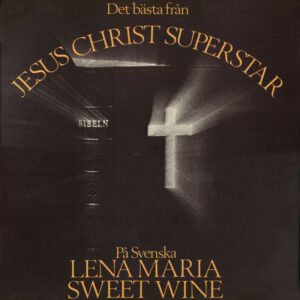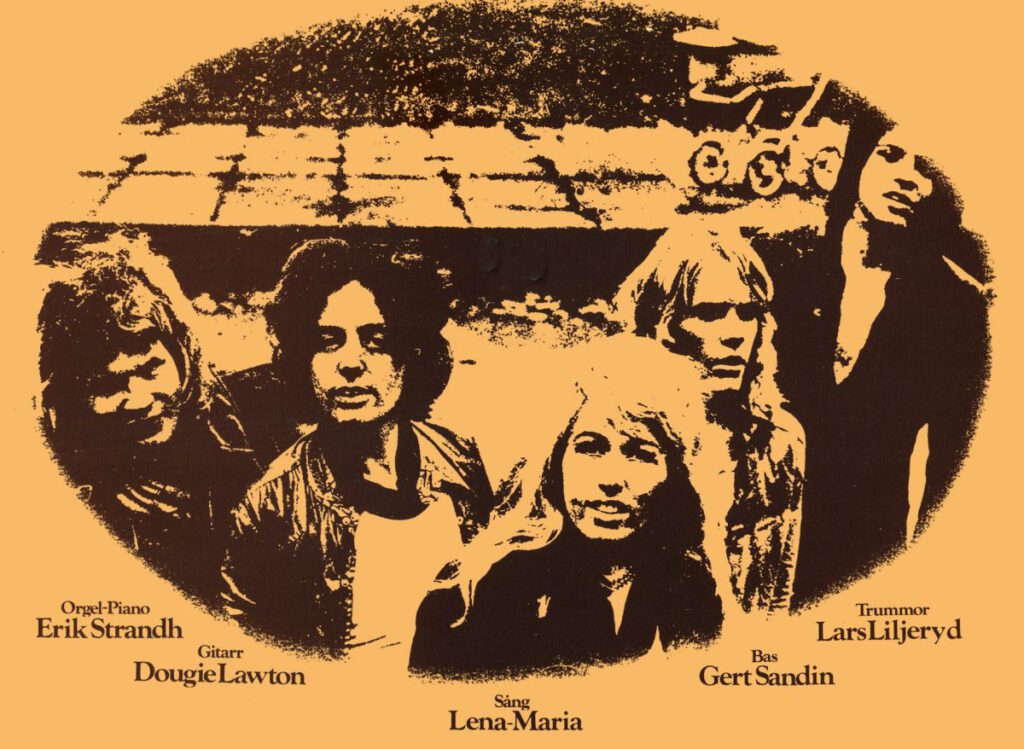Artwork
Recording Information
Classification: Lena-Maria & Sweet Wine
Year of release: 1972
Language: Swedish
Type: Studio cast
Cast
Vocals: Lena Maria Gårdenäs
Choir: Eva Nordberg, Susie Heine, Karin Stigmark and Beverly Sundell
Orchestra
Organ/Piano: Erik Strandh
Guitar: Dougie Lawton
Bass: Gert Sandin
Drums: Lars Liljeryd
Track Listing
Side 1:
Introduktion (Overture)
Ditt Folk Har Du Förlett (Heaven On Their Minds)
Vad Står På (What’s The Buzz)
Hosiana (Hosanna)
Templet (The Temple)
Side 2:
Vad Skall Min Kärlek Föra (I Don’t Know How To Love Him)
Dömd För Alltid (Damned For All Time)
Blodspengar (Blood Money)
Herodes Sång (King Herod’s Song)
Jesus Christ Superstar (Superstar)
Audio Production Information
Produced by Håkan Sterner
Engineered by Anders Lind
Mixed by Sverre Sundman
Translation by Britt G. Hallqvist
Arrangements by Dougie Lawton
Cover Design: Christer Brobacke
Photography: Leif Engberg
Recorded in Studio Decibel, March 1972
Historical Notes from a Fan
When any show is a hit, a lot of people will be quick to capitalize on the show’s success. In this case, Jesus Christ Superstar was one of the first albums of its kind, and everyone wanted their slice of the pie where the Passion According to Tim and Andrew was concerned. At this time, many “budget” labels famous for releasing low-cost sound-alike albums (“knock-off” recordings capitalizing on shows, songs, or albums that became hits) jumped into the fray.
The performers were usually never an actual ensemble that had performed JCS (indeed, in its early days, the number of actual casts performing the show was very few), but instead merely a group of vocalists who recorded songs from the show. Usually, these recordings were very cheaply put together and produced, and priced to own. (In the future, albums like these, now labeled “studio cast recordings,” could no longer be accurately described as simple cash grabs, but at the time, the use of the phrase “knock-off” is appropriate.) Though it may be a matter of opinion, this particular fan feels that since the performers on these studio recordings lack the experience of getting on a stage and performing the show in front of an audience, the performances are pleasant enough, but not always up to par with a real cast album.
This recording, a pretty funky rendition by a Swedish group whose lead vocalist, Lena-Maria, had had success in various groups and went on to sing backup for several noted Swedish artists, including ABBA (which association led to her appearing in ABBA: The Movie), is, like the French Barclay recording before it, an example of a phenomenon which will recur frequently in the history of JCS: namely, the “chicken or egg: which came first?” situation. Like the Barclay recording, Lena-Maria & Sweet Wine used translated lyrics by Britt G. Hallqvist which also appeared in the Swedish stage production, drummer Lars Liljeryd refers on his website to the group having toured Sweden with JCS in 1972 (whether to promote this record or as part of the actual production is unclear) though “none [of them] was particularly religious,” and, as in the case of the Barclay recording, not only is its association with any production unclear but whether or not this recording pre-dated the official Swedish run.
At any rate, while this little album seems to have been a footnote in the careers of all concerned, it is nonetheless a part of JCS history like all other recordings of its type, and as such, its presence here is well-warranted.
Reviews
There are no reviews yet. Be the first one to write one.


